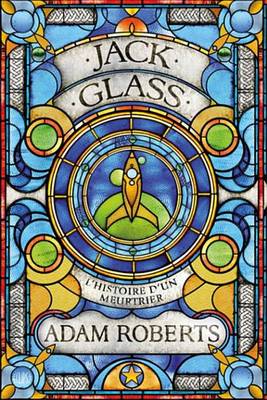Reviewed by Rinn on
My very first impression of this book was that the cover is absolutely gorgeous. And I may be one for judging a book by its cover – I voted for this in our bookgroup poll, and am glad it won. A strange tale, we know from the very beginning who the murderer is in each of the three stories. But what we don’t know is how the murder happened. It’s a wonderful twist on the traditional Whodunnits of golden age crime.
The first story instantly has the reader aware of the difficulty of the situation the characters are in. However, Roberts has created such a despicable cast that I felt absolutely no sympathy for the men whatsoever. Even the pitiful character, the ‘runt’ of the group, is much too pathetic to even feel remotely sorry for. We know that these men are criminals, but we don’t know what they’ve done – they guess at what each of them committed in order to be holed up in the asteroid – but it’s a guessing game, and the reader is left to make their own decisions. Were it not for the prologue, and the fact that we are informed that Jack is the killer in each story, it would be difficult to guess. As a prisoner he is meek, at the bottom of the food chain and unassuming. Which only makes it all the more shocking when his plan is revealed; Jack just suddenly snaps and it happens in a frenzy, a total contrast to his previous placidness.
Ending in a very grisly conclusion, we also find out why Jack has been tirelessly working on making glass. And whilst the science behind his escape is questionable (and hard to explain without giving away any spoilers), it’s fascinating in a gruesome way.
Part two is something completely different. In fact, Jack is nowhere to be seen, until he reveals himself later on – I had my suspicions about his identity, but was actually thrown off the scent by something Roberts said, so it was quite fun to find myself both right and wrong! The two sisters were not particularly likeable – as they were supposed to be, teenage/young adult spoilt brats – but one with a passion for murder mysteries. One just happens to occur on her front lawn, and of course she has to look into it, which is where the story really begins. Part two is perhaps much more of a traditional Whodunit than the other two parts.
Part three felt a little inconclusive. The setup was good, but it was a bit of a wild goose chase in a way, which was frustrating – I think it was perhaps my least favourite of the stories. In each story, Jack was like a different person, and he also changed throughout. In the first he went from a withdrawn, quiet and mysterious man to a psychotic killer, and in the others – well I can’t really talk about it without ruining part of the story!
It was quite fun to get a little tip to Roberts’ other work – people who live on the edge of the Earth’s atmosphere were referred to as ‘uplanders’, as they are in Gradisil.
The first story was a little slow to build up, but I felt that its conclusion made up for it. If I think back to the other work of Roberts’ that I read (Gradisil), I would say he has a talent for building up moments slowly and carefully. One of my main issues, which started with part two, was the use of terminology that wasn’t really explained. There is a glossary in the back of the book, but for one such entry that I didn’t completely understand it explained what the acronym stood for, but not what it actually meant.
Overall, a fun read (and I’m absolutely in love with the cover) and a great variation on the traditional science fiction and crime stories. But I would, however, have liked some stronger points linking the three stories together.
Reading updates
- Started reading
- 8 November, 2013: Finished reading
- 8 November, 2013: Reviewed
